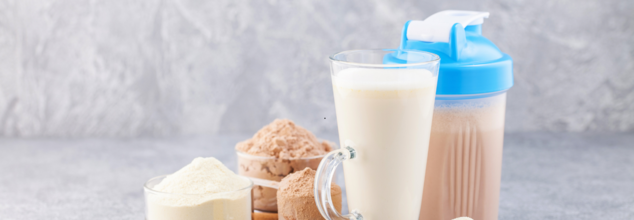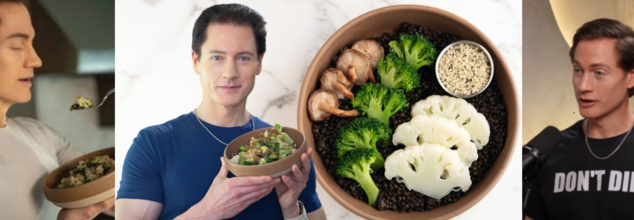- Health Conditions A-Z
- Health & Wellness
- Nutrition
- Fitness
- Health News
- Ayurveda
- Videos
- Medicine A-Z
- Parenting
- Web Stories

Credit: Canva
Bryan Johnson Launches New Religion 'Don't Die'- Here's How To Become A Member
Bryan Johnson, the US billionaire known for his anti-ageing endeavours, is building a new religion that is aimed at saving human life. In a series of X posts, Johnson introduced his new ideology, "Don't Die", which he believes is the key to human survival and aligns artificial intelligence (AI) with humanity's best interests. "Don't Die is the next great framework. It's how we transition into the era of AI and solving death," he wrote in one of his posts. The tech millionaire also announced the launch of his new app and urged people to be a part of it to become those who can be "admired and respected" by the 25th century.
'Dear Humanity, I am Building A Religion'
"Dear humanity, I am building a religion. Wait a second, I know what you're going to say. Hold that knee-jerk reaction and let me explain. First, here's what's going to happen: + Don't Die becomes history's fastest-growing ideology. + It saves the human race. + And ushers in an existence more spectacular than we can imagine. It is inevitable. The only question is: will you be an early or late adopter?" he wrote.
The 47-year-old underscored that the world is undergoing "four fundamental shifts". "We are giving birth to superintelligence (AI), No existing ideology solves AI alignment, With AI, our species' survival is not guaranteed and With AI, individual biological death is no longer inevitable," he explained, adding, "We are at risk of extinction without a unifying framework to solve human alignment and AI alignment." To address this, Johnson described "Don't Die" as "a universal translator and the grand unifying theory of existence".
"On a personal level, for years I've tried to eat, sleep and breathe Don't Die, literally. To embody it in every one of my 35 trillion cells. Practically this means: + going to bed on time, exercising daily, and eating nutritiously + measuring and improving every organ in my body + eliminating toxins, lowering stress, being with family and friends," he shared. "As a result, I now have the slowest aging speed in recorded history. Science, measurement, and protocols work. The same methodical approach can scale to earth, AI, and the human species," the millionaire explained.
Become A Don't Die Member
In conclusion, he shared a link inviting people to apply and urging them to be a part of the framework. "BECOME A DON'T DIE CITIZEN: Download the Don't Die app, track your Don't Die Score, connect with others, and start a local community. This is how we turn Don't Die from an idea into a global movement," he wrote. Here is the link to join this new religion- https://dontdieapp.com/

Credits: Canva
How To Take Your Protein Powder The Right Way?
Protein shakes are always the most popular when it comes to fitness. It is used to boost your protein intake and also support your muscle building. Not only that, but the benefits extends to supporting your bone health and weight loss. It is not an unknown fact that protein is the building block of human body and is one of the important macronutrients that helps us with growth, along with supporting cells, organs and tissues.
The great thing is that now it is easily accessible as it can be consumed via shakes. But, how exactly must one consume it? Is there a right way to consume it?
So, What Is The Right Way To Consume Protein?
The million dollar question is, whether you should consume your protein powder with milk or water? The answer depends on your health goals and of course, taste preference.
If you are focusing on a low-calorie intake, you can go for a water based shake, since water has no calories.
However, if you want to add on a few calories in your drink, you can then go ahead with milk. Milk is also packed with carbs, fat, and protein. There is substantial data that also supports that a cup of milk contains around 150 calories, 11.3 grams of carbs, 7,81 grams of fat, and 7.98 grams of protein.
What Else Matters When You Choose A Base For Your Protein Shake?
The taste and texture of your protein shake often come down to personal preference. If you enjoy a creamier consistency, try blending your shake with plant-based milks like almond, coconut, or soy. These options add richness and subtle flavor. Water-based shakes, on the other hand, tend to be thinner and more neutral in taste.
For those who are lactose intolerant—a condition where the body has trouble digesting lactose, the natural sugar in dairy—using water or lactose-free milk is a gentler choice. Consuming regular milk can lead to uncomfortable symptoms like bloating, gas, and even severe diarrhea.
What Are The Benefits Of A Water Based Protein Shake?
- Water has zero calories, so it could be a great way to consume for weight loss
- Water-based protein shakes are convenient and can be enjoyed without worries about the drink going bad
- When water is mixed with proteins, it can help cut your carbs intake
What Are The Benefits Of A Milk Based Protein Shake?
- Adding a cup of milk to your shake boosts its protein content
- Milk contains both whey and casein proteins, which support muscle repair and growth
- It's also a good source of carbohydrates that help restore glycogen—your body’s energy reserve used during intense workouts
- Research suggests that consuming milk after exercise can enhance muscle growth, ease post-workout soreness, reduce muscle damage, and aid rehydration
- In short, milk helps build strength and supports overall recovery
Which One Gives The Best Results?
Experts say that whether you use milk or protein powder in your shake, both can help you reach your fitness goals. However, mixing protein powder with milk might be better for people who go to the gym or lift weights often.
Milk supports muscle growth and helps reduce soreness and muscle damage after workouts.
Protein powders like whey or pea protein offer similar benefits. So even if you choose water instead of milk, you’ll still get the advantages of using a good protein supplement.

Credit: Canva
Is Climate Change Affecting The Rice In Your Kitchen?
As climate change intensifies, researchers have predicted that arsenic in rice could increase and trigger a major public health crisis. Rice is a staple in many countries. In Asia, particularly in Japan and Korea, it is an important component in all meals. A rise in the arsenic, therefore, could seriously exacerbate deadly diseases, including cancer.
What is Arsenic?
Arsenic is a naturally occurring metallic element, widely distributed in the Earth's crust and found in various forms, like inorganic and organic. Research shows that it is toxic and does lead to severe health issues like cancers of the bladder, lung and skin, as well as several cardiovascular and neurological diseases.
Why is arsenic content in rice increasing?
Researchers from Colombia University, stated that an increase in temperatures above 2 degrees Celsius combined with rise in carbondioxide in the atmosphere can alter the soil chemistry, favouring arsenic, which gets more easily absorbed in rice grain. Contaminated soil and irrigated water while growing rice are known to increase inorganic arsenic in rice.
What Did Researchers Say?
The study was conducted by researchers from Columbia University and published in The Lancet Planetary Health. The study explained that an increase in temperatures above 2 degrees Celsius and rising levels of carbon dioxide could be causing changes in soil chemistry, favouring arsenic, which gets more easily absorbed into a rice grain. Contaminated soil and irrigated water from that area, while growing rice are known to increase inorganic arsenic in rice.
"Our results suggest that this increase in arsenic levels could significantly elevate the incidence of heart disease, diabetes, and other non-cancer health effects," said author Lewis Ziska, associate professor of environmental health sciences, Columbia University, said. "We found that temperature and CO2 act synergistically to increase arsenic concentrations in rice, compounding dietary arsenic exposures for rice consumers and leading to projected cancer cases in the tens of millions among populations of Asian countries in 2050," according to the study.
Are there any mitigation strategies?
There are ways to mitigate arsenic exposure. This includes breeding plants to minimise arsenic uptake and improved soil management in rice paddies, along with health initiatives. THE US FDA also recommends replacing cereals from rice with those with whole grains. Published studies, including research by the FDA, show that cooking rice similar to how pasta is cooked can reduce 40 to 60 per cent of the inorganic arsenic content, depending on the type of rice. However, this method of cooking rice in excess water—using 6 to 10 parts water to 1 part rice and then draining the excess water—also results in lowering the nutritional value of enriched polished and parboiled rice

Credits: YouTube and Instagram
The Longevity Diet: Bryan Johnson Eats 3 Meals In 6 Hours—With Extra Virgin Olive Oil
Bryan Johnson, the 47-year-old tech entrepreneur who is known for his anti-ageing techniques and for his quest to reverse his biological age has finally ditched the medicine that has kept him young. He had recently been featured in Netflix documentary Don't Die: The Man Who Wants To Live Forever, where he has shown his various attempts on achieving more time on the planet, his quest for longevity.
To live 'forever' he had been consuming 13 milligrams of immunosuppressant rapamycin for the last five years. However, he has now given it up after he found out that the side effects outweighed the advantages.
As per the opinion article published in Impact Journals, titled Rapamycin for longevity, it can extend maximum life span nearly three-fold. It can also prolong life in normal mice as well as in yeast, worms, and flies, and prevents age-related conditions in rodents, dogs, nonhuman primates and humans. It has been FDA-approved for humans and has been used safely for decades. In 2006, it was suggested that rapamycin could be used immediately to slow down aging and all age-related diseases in humans. However, another study published in Oncotarget, titled About-face on the metabolic side effects of rapamycin, it can lead to metabolic defects, including hyperglycemia, hyperlipidemia, insulin resistance and increased incidence of new-onset type 2 diabetes.
Now without the medicines, what all does Johnson do to keep his quest for longevity going? He focuses on what he eats!
The Diet For Longevity
On a podcast with Jay Shetty on his show On Purpose, he revealed that he ensures his daily diet is roughly of 2,500 calories per day and his meals are all between 6 am and 11.30am. The NHS also recommends that an average man needs 2,500kcal a day.
His day starts with 54 supplements and an hour in the gym. He also revealed that he has never had cheat meals in his life ever. "Now the idea of eating a piece of pizza or a whole pizza or like a doughnut or something just makes me sick. Because if I'm going to do it, there'll be like five seconds of maybe enjoyment and then you've got like an entire day of misery."
What does he eat? He consumes "A lot of broccoli, cauliflower, lentils, hemp, pea protein, hemp protein, berries, nuts, seeds."
What Are The Three Meals In 6-Hours He Eats?
The Supper Veggie
This consists of broccoli, cauliflower, black lentils, ginger, and garlic.
The Nutty Pudding
This is made with macadamia nuts, walnuts, flax seeds, pomegranate juice, and berries, combined with pea and hemp protein.
A Mix Of All
The third meal can vary, but it usually includes a mix of all, vegetables, berries, nuts, and seeds.
ALSO READ: Bryan Johnson Launches New Religion 'Don't Die'- Here's How To Become A Member
The Extra Virgil Olive Oil On The Side
He also revealed that additionally, he also consumes a tablespoon of extra virgin olive oil with each meal and 6g of pure cocoa. "We’ve tried to construct a perfect diet, so every single calorie I consume has a specific objective," he says. This is a "stack superfoods across the board".
He is currently consuming 80 grams of protein, after he struggled at 120 grams of protein. His gut health could not take it.
Johnson also compared extra virgin olive oil to Ozempic, due to its potential health benefits and benefits in weight management and glucose control.
In one of the episodes of All The Diary Of A CEO podcast, he said, “What things can I do in my life that are easy and actionable, and have a high impact? Extra virgin olive oil is very close to number 1. It is better than Ozempic. It is.”
Johnson says that both Ozempic and extra virgin olive oil can stimulate the release of GLP-1, which is a hormone that regulates appetite and blood sugar levels. The extra virgin olive oil is a high-quality oil that is extracted from the first pressing of olive and is thus considered the purest and healthiest oils due to its rich nutritional profile.
“There is a study, where people lost 5.2 pounds consuming EVOO for nine weeks (in addition to what they are currently eating). I think the quantity for the study was 45 ml daily or something like that; it is between 30-60 ml daily. But there's things, for example, like it reduces by over 60 percent invasive breast cancer, it reduces your blood sugar levels by 60 percent post a meal and your oxidised LDL levels. The bad thing is that your body is causing damage by 80 percent post a meal. So, I have a tablespoon (of olive oil) with every single meal and it is like the super of superfoods," he said.
© 2024 Bennett, Coleman & Company Limited

